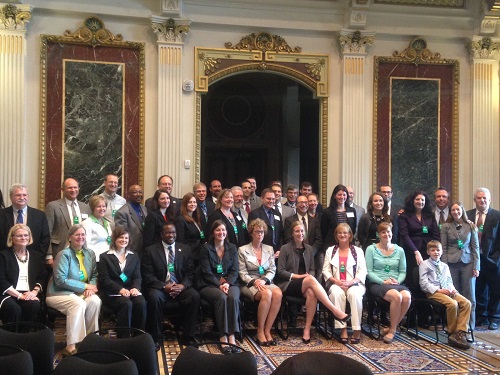
Kickoff of Georgetown University Energy Prize competition.
Today, the City of Cambridge took an important step toward improving its energy standing by signaling its intent to compete for the Georgetown University Energy Prize, a national competition that aims to dramatically improve America’s energy standing by challenging communities across the U.S. to rethink their energy use. At a press conference in Washington, D.C. the City of Cambridge was announced as one of more than 50 communities who have signed letters of intent to compete for the Prize.
“We are excited to get underway in this competition and to establish Cambridge as a national leader in energy efficiency in the United States,” said Mayor David P. Maher. “For many years, Cambridge has been a strong advocate for a variety of innovative sustainability methods and the Prize competition will help challenge our city to contribute further to a high quality of life for our residents. Competitions like these bring out the best in municipalities and Cambridge is thrilled to be a part of it.”
With today’s press conference, the Georgetown University Energy Prize’s Application Phase is now officially open for the nearly 9,000 eligible U.S. communities with a population between 5,000 and 250,000. During this Application Phase, Cambridge will work closely with NSTAR and local energy efficiency experts to develop an energy-saving plan before June 30, 2014.
“The City of Cambridge is committed to sustainability and we recognize that serious gains in energy efficiency are needed to reach our climate change mitigation goals,” said City Manager Richard C. Rossi. Participating in this competition will help invigorate the community around innovative ways to save energy as we look to putting Cambridge on the trajectory of becoming a net zero greenhouse gas emissions community.”
Currently, Cambridge is working on many levels to reduce energy use and greenhouse gas emissions to make the city more sustainable. Last year, the city, Harvard University, MIT and a group of major business partners created the Cambridge Community Compact for a Sustainable Future to leverage the intellectual and entrepreneurial capacity of the business, non-profit, education and municipal sectors in Cambridge to foster collaboration on creating a healthy, livable and sustainable future. This year, the Getting to Net Zero Task Force is advancing the goal of putting Cambridge on the path towards becoming a net zero community, with the focus on carbon emissions from building operations. The City Council will soon review a Building Energy Use Disclosure Ordinance that will provide data and transparency around how energy is used in large buildings citywide, with the goal of providing the marketplace data to enable better implementation of energy efficiency opportunities. In Kendall Square, the city’s largest area of energy use, a new model of public-private partnership is being piloted using the EcoDistricts Framework, which emphasizes the integration of smart infrastructure, green buildings and community engagement to achieve district-scale sustainability. All these initiatives are occurring while the city is conducting a climate change vulnerability assessment. The energy competition will heighten the City of Cambridge’s drive to unite the entire community to embrace energy efficiency on a large scale.
“The City of Cambridge is looking forward to tapping all the resources our community has, including NSTAR, the universities, business community and non-profits since we need everyone to contribute in order to succeed,” said Meghan Shaw, Outreach Director of the Cambridge Energy Alliance.
Harvey Michaels, Director of the MIT Energy Efficiency Strategy Project, added, “MIT is excited to work with our hometown, the City of Cambridge, in achieving energy saving that will secure the Georgetown University Energy Prize. The competition offers us the opportunity to put creative MIT student ideas into practice so we can improve the adoption rate for energy efficiency programs, like multi-family building retrofits. Furthermore, working to tackle energy efficiency strengthens the new Community Compact for a Sustainable Future, which leverages the city and MIT’s combined capacities in research, teaching, innovation, entrepreneurship and program development.”
Once Cambridge’s plan has been submitted, it will be evaluated against applications from other interested communities and considered for potential advancement to the Quarterfinals, Semifinals and Finals. The Prize will conclude in 2017, when one winning community is awarded a $5 million prize purse for use on energy efficiency programs that help ensure the continued implementation of its long-term energy-saving plan.
“Many homes, schools, businesses, governments and individuals have already begun to do their part in reducing energy consumption—but it’s not enough,” said Dr. Francis Slakey, Executive Director of the Georgetown University Energy Prize. “In order to fully realize the benefits of energy efficiency initiatives, we must commit to addressing our national energy problem together, one community at a time.”
To learn more about the Georgetown University Energy Prize and to track the competition’s progress, visit www.guep.org, or follow the Prize on Twitter (@GUEnergyPrize) or Facebook (www.facebook.com/guenergyprize).
For more information about Cambridge’s efforts and ways you can get involved, please visit www.cambridgema.gov and www.cambridgeenergyalliance.org or contact Meghan Shaw at 617-349-5323.
About Georgetown University Energy Prize
The $5 million Georgetown University Energy Prize challenges small- to medium-size towns, cities, and counties to rethink their energy use and implement creative strategies to increase efficiency. To compete for the Prize, local governments, residents, utilities and others will need to work together to demonstrate success in sustainably reducing energy consumption over a two-year period. For more information, visit www.guep.org.



